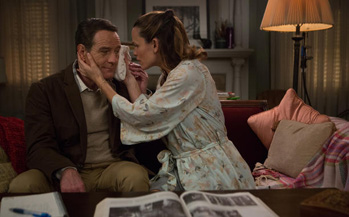They Shoot Oscar Prognosticators, Don't They?
Telluride Final Thoughts
By J. Don Birnam
September 6, 2016
BoxOfficeProphets.com

The Final Buzz: No Big Surprises
There were no big surprises in the last announced films of the day. Instead, new favorites gained word-of-mouth popularity, including Richard Gere’s Norman, as well as some more indie foreign fare.
Instead, the initial battles lines for awards consideration were drawn. Sure, huge names like Martin Scorsese, Ang Lee, and Mel Gibson have movies premiering later this year. But since no movie has won Best Picture before an October release since 2004, since seven of the last eight Best Picture winners screened at Telluride, forgive me for betting against the yet-to-be-seen releases. Instead, La La Land looks like an early good bet, where more indie-fare like Moonlight and Manchester by the Sea have shots at least at a nod - though I wonder more about their chances of winning, since they are not universal crowd-pleasers.
On the acting side, Casey Affleck is clearly headed for a nomination, while a slew of other performances have outside hopes for a nod (see below). I think that category is still wide open. The women, by contrast, are headed for another heated race for the nomination. Emma Stone, Amy Adams, and Rooney Mara were spotted hanging out together all weekend in Telluride, and I expect them to spend a lot of time together over the next six months as perennial awards contenders. Still, others like Ruth Negga and Viola Davis have a shot at knocking at least one of them out in the end.
More Screenings
Since we last spoke, I caught Bryan Cranston’s new film Wakefield, really a one man play, Pablo Larrain’s Neruda, a poem to the famed Chilean’s poet, Frantz, a heart-breaking World War I story, and Richard Gere’s quirky Norman: The Moderate Rise and Tragic Fall of a New York Fixer, his potential little Oscar vehicle.
The overall theme that emerges is the contrast between the anxieties of men and women central characters in film. Just like La La Land and Arrival seem to point in opposing directions when it comes to what the future of cinema should look like, movies that center around men have a markedly different focus than those where women dominate.
In Wakefield, for example, Cranston’s character has had it with domestic suburban life and “disappears” into his family attic, leaving his wife and two girls to fend without him, all while he keeps a watchful eye on them from across the garage. Setting aside the improbable nature of the story, and recognizing Cranston’s mete in carrying the entire film almost entirely alone while locked up in an attic, the film is mostly uninteresting. Middle-aged male anxiety about family and life has been fodder for film for decades, and this film breaks no new ground. These are the performances that normally garner awards attention, but I don’t see it for this one.
Gere’s vehicle, at least, is a more charming spin on the tale. His Norman is infinitely more likable than Cranston’s Wakefield, even if they are both equally duplicitous. Norman is trying to connect people, to do “favors,” to be able to cash in later. The twists and turns of his complex webs take him into the middle of a thorny scandal in Israeli politics, which at least keeps you glued. Again, though, it is hard to see something new here, and while Gere surely is hoping for that elusive Oscar, I’d be stunned if this were the role to give it to him.
What is it with the title of these movies being men, anyway? Even the more female-oriented Frantz bears the title of a male character - a dead male character - that haunts the existences of the people in the film in different, devastating ways. Anna, his fiancée, has to deal with the grief Frantz’s death during World War I has caused his parents, but also herself, when, unexpectedly, a Frenchman shows up in their village who is also devastated by Frantz’s death. The story goes in some expected but mostly unexpected directions, weaving in and out between black-and-white and color cinematography, signifying different levels of happiness and misery for the characters. In the end, Frantz’s death means something different to each of them, and they must all negotiate and resolve these conflicting feelings.
And finally there is Neruda, by the filmmaker behind the Oscar-nominated No. The focus is on the poet as he is being accosted by an ambitious but clumsy police inspector who has been instructed to apprehend the accused communist traitor. While the film is beautifully shot and even interesting, some of the poetry feels self-indulgent in its lyricism. Larrain’s other festival entry this year, Jackie, seems more interesting.
To come
Well, that’s it. The Toronto International Film Festival is next, though nothing on the lineup that is new screams Oscar fare. Sure, Loving and Birth of a Nation will screen after their early year festival releases, and both will face important tests, that of the ability to please audiences. My instinct, though, tells me that La La Land is the prohibitive favorite to win the top prize at TIFF - it is a quintessential crowd-pleaser.
Some movies are making debuts there, but they seem to fall more into TIFF’s latest (unfortunate) trend to just precede big-box releases by a few weeks. That lineup includes The Magnificent Seven, Snowden, and Deepwater Horizon. It seems as if TIFF is slowly shifting from Oscar launching pad to Oscar second stepping stone. They are less interested in discovering the next Slumdog Millionaire and more into bringing the largest stars into town. A dangerous pattern, if you ask me.
Again, stay tuned.